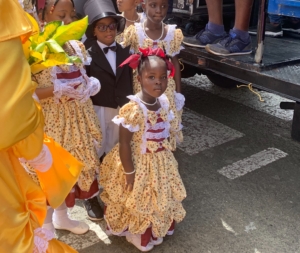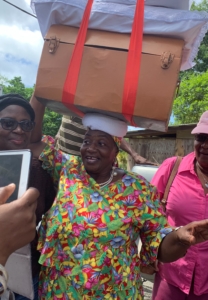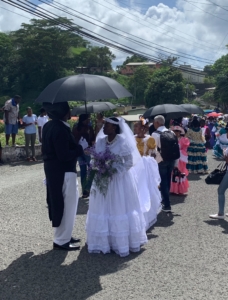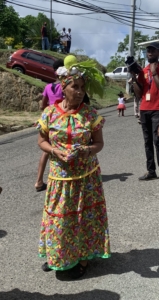New Connections to Caribbean Culture

Children keep traditions alive in Tobago Heritage Festival’s Ole Time Wedding (2019)
After spending most of my childhood and adult life feeling confused about my cultural identity as a first generation American, a trip to Trinidad and Tobago in 2019 reset my relationship to my roots.
During my trip to Trinidad, I saw the house where my mother was born and the convent school she attended. My mother and I walked passed the barracks in which my father lived as a police officer. We began to understand my grandmother’s story of survival in an abusive family and how she strived to extend herself and her talents beyond the grasp of her lush, colorful but small island.
However, my brief visit to Trinidad’s sister island Tobago was just as pivotal to my understanding of the Caribbean. During my stay, I had the opportunity for the first time to see people of all ages engage in the preservation and history of Caribbean culture during their annual Tobago Heritage Festival.
Reflecting Insecurities, Ignorance and Regrets

Scenes from Tobago Heritage Festival’s Ole Time Wedding (2019)
This trip to my family’s homeland was important to me because for nearly three decades, my absence from Trinidad left me insecure and ambivalent about my relationship to my own heritage.
When I was at Georgetown University, I would find “Caribbean Culture Circle” (CCC) fliers on campus bulletin boards or classroom walls. I attended one meeting as a freshman and froze when one of students asked if I had ever been to the Caribbean. As she stared at me waiting for an answer, I hesitated to admit I hadn’t traveled south of Virginia. No one made me feel unwelcome when they heard this. However, my insecurities made me feel so out of place and so distant to a culture I was claiming that I never returned to the meetings.
One afternoon a year or so later, one of those CCC flyers hanged on the wall of the cramped classroom in which I took my Latin classes. Just a class began, a white male student looked up the sign and said, “there is no such thing as Caribbean culture.” He asserted, “They have culture with a K.” He affirmed that it was Europe that had true culture. I was shocked, embarrassment and angry. But I said nothing.
For years I lived with my shock at his words and my reaction. I didn’t know Caribbean culture. How would I know how to defend it? I was relieved that at least one white female student used her privilege to put him down for his racism and Eurocentrism. However, I quietly carried the shame of my silence, fear and ignorance for years.
Looking Forward: (Self-) Discovering the New World
Slowly exploring my family’s culture through graduate work and travel has forced me away from Eurocentrism and closer to the culture I was connected to all along. I grew up eating ground provisions, salt fish, pigeon peas and rice, curries and rotis. I learned from the stories my grandmother passed down to us. Through my own research, I discovered histories of slave rebellions and Indian indentured servitude. I began to appreciate Calypso and Soca and performances that conveyed the richness of Caribbean self-expression.
But, setting foot in Trinidad and Tobago and seeing people perform aspects of a culture that has long and multiple histories throughout the Caribbean, Africa, and Europe was breathtaking.
Although there were controversies that year surrounding the sustainability of the Heritage Festival, my experience of its Ole Time Wedding was invaluable.

Ole Time Wedding’s Bride and Groom

Woman with Breadfruit in Ole Time Wedding
Video of the event available at my channel
On Becoming and Finding New Identities
To paraphrase Jamaican-born British cultural theorist Stuart Hall on identity in his essay “Cultural Identity and Diaspora” (1990): we may strive for a fixed identity, a sense of being whole and complete, but this aspiration, although comforting, is based in fiction. Inspired by the heterogeneity of Caribbean identities and cultures, he theorized that we, instead, are in a state of constant transformation.
People within the Black diaspora, violently separated from Africa through the Transatlantic Slave Trade, may believe that a visit to the Door of No Return on Gorée Island or other symbolic trips to Africa can heal generational trauma and resurrect a lost version of the self. However, Hall explains,
“Far from being grounded in mere ‘recovery’ of the past, which is waiting to be found, and which when found, will secure our sense of ourselves into eternity, identities are the names we give to the different ways we are positioned by, and position ourselves within, the narratives of the past” (224).
While I continue to unearth histories of my family and Afro-Caribbean ancestors, I know no particular name or date will make me find the place I belong…because that place does not exist. Instead, I am learning to find a lot of comfort in this idea of constant transformation. Rather than imagine how others may perceive my relationship to Trinidad and my heritage, I am beginning to look for ways to craft my own evolving positions in relationship to Afro-Caribbean and the cultures this region has influenced.


 Photo by manu mangalassery from Pexels
Photo by manu mangalassery from Pexels